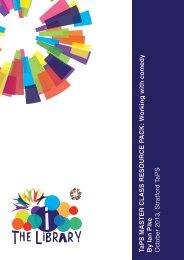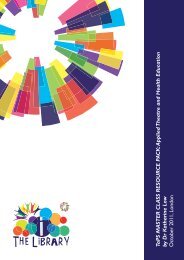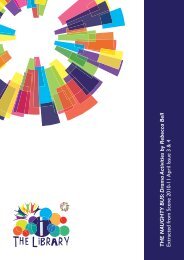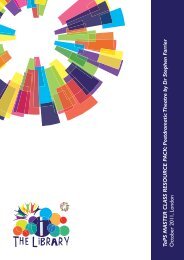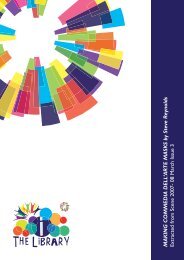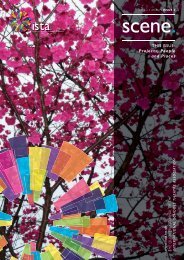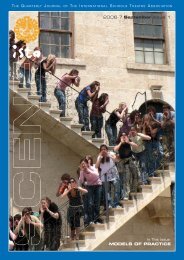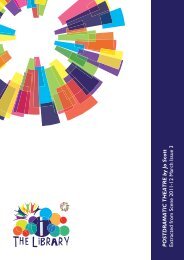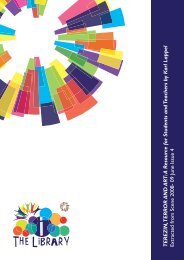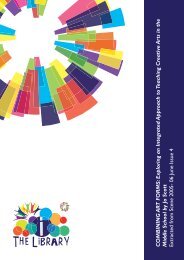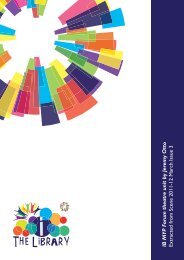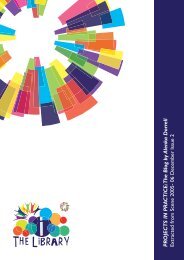ISTA-Scene June 08
ISTA-Scene June 08
ISTA-Scene June 08
- No tags were found...
Create successful ePaper yourself
Turn your PDF publications into a flip-book with our unique Google optimized e-Paper software.
By questioning the children as if they arein role, I can help them picture that world,and the role gives public voice with which toshare the creations of their imaginations(Booth, 1994:18)There are also wonderful opportunities inthe elementary/primary division of your, or aneighbouring school - have your studentsintroduce Story Drama to younger childrenas a means of unraveling a new potential forthe devising process. Seek out stories in themost unusual places! What better way toexplore and absorb a new culture than touncover its many legends, myths, fables, folktales, ghost stories, mysteries, allegories andbedtime stories?Over the years, I have seen a single talegive rise to a hundred different treatmentsand interpretations, determined by theparticipants and the moment, each storydrama unique, yet included somewherewithin the original story’s fabric (Booth, 1994:11-12)Teacher-in-Role and Mantle of the ExpertDrama is to be about meaning-indicating,meaning-seeking, meaning-making andmeaning-finding… with this Heathcotealways keyed in to her pupils’ readiness towork in depth (Acting in Classroom Drama,Gavin Bolton, 1999: 177)Dorothy Heathcote established for manythe efficacy of “Living through” drama andthe “Teacher-in-role” within the classroom.These conventions were most oftenattempted, in part, to provide students withthe chance to engage with making meaningout of situations and/or information. This isby no means simply having the teacher playa role; the teacher continuously comes out ofrole to allow students to reflect and negotiatemeaning and provides opportunities forreflection. By definition, this is a managedevent: time and space are manipulated forthe purposes of approaching problems,making judgements and exploring issues.Her approach is based on a communalperspective, so that pupils take on their rolesas ‘we’ the people of this culture and not as‘I’ an interesting individual interacting withother individualistic characters…it is rarelyabout a particular personality; it is about theproblem we have to face as a community(Bolton, 1999: 186).I have found the search for meaning andthe students’ readiness to work in depth aparticularly useful exploratory device in theresearch context of devising. What betterway to engage your students in the searchfor information and its meaning than in role?In practice, I create situations based on theaccumulated research and then experimentwith potency, relevance and meaning. The“Teacher-in-role” can also raise the level ofcontent and often draws particular attentionto information or issues that may surfacethrough the course of the improvisations.Students are invited to look for implications,check motivation, evaluate information,assess consequences and make decisions.It is not merely unrehearsed butunrehearsable. (Bolton, 1999: 180)I have found “Mantle of the Expert”, alater convention of Heathcote, to be equallyeffective in the research context of devising.In addition to exploratory improvisation beingused to qualify research, characters,situations and meaning, Heathcote turned tothe question of how the pupils’ perspectivesshould be framed.We shall see that ‘framing’ and ‘taskselection’ became the pivotal structures ofMantle of the Expert (Bolton, 1999: 227)“Mantle of the Expert” involves looking ata situation from a particular point of view.Within the improvisation, students are giventhe role of an “expert” related to the chosenarea of research. These portrayals will requireconsiderable preparation; I find placing theresearch in a performative context allows thestudents and myself to explore specificdetails in an authentic way. In addition, thisoften creates considerable interest forstudents during the context of research – anarea normally equated with dental surgery. Inaddition, this provides multiple perspectiveson a given subject as well as a new methodof discarding less useful information.‘Busy Authority’ sums up the ‘Mantle ofthe Expert’ role. From this point inHeathcote’s teaching, this was thespringboard from which all learning could bepursued ‘Mantle of the Expert’ canaccommodate for anything in drama, for themethod can be used to teach anything(Bolton, 1999: 241)I have my students carry out researchtasks as experts – designing, tracing,reporting, measuring, decoding, visualizing,demonstrating, instructing etc. I have thembring whatever they’ve accumulated to thesession and then launch the improvisation viashort, precise tasks relevant to the stimulus,theme or form. Although as a facilitator, I amstill in role, I act only as a colleague to thefellow “experts”. Here I have the chance tocreate and maintain a professional vocabularywith my students in role and to determine thequality and validity of their research.Dorothy Heathcote has found a way ofbringing the power of make believe into theclassroom so that her pupils can be ‘insidethe skin of the expert’ and achieve ‘his senseof joyous intellectual adventure’ using, not theidentity of a Scout movement culture, but thatof an enterprise culture (Bolton, 1999: 244)What should Heathcote’s followersunderstand first and foremost? The answer Ibelieve lies in ‘authenticity’ …she means arigorous attention and respect for what istrue, true for the scientist and scholar andthe artist and craftsman…A passionateinterest in how things are made and who willbe responsible for them underlies heremphasis on tasks, for tasks rely on that kindof knowledge (Bolton, 1999: 244)Interplay: Integrating the ArtsIf a child has a particular image, thought,or feeling to express, then he or she shouldbe able to choose the best form in which toexpress it (Alistair Martin-Smith in Warren,1994: 96)The above was written by a fineprofessor of mine back in my Windsor days.He introduced me to the concept of Interplayas being more than just a little music andartwork added to the drama. Although wehave all explored cross-curricular projects, itis worth looking at the value of incorporatingmusic, art, drama, writing and dance into thedevising process as equal mediums, eachcapable of reaching students in new andunique ways.Working to integrate the arts helps tobridge the gap between image andword…the creative media should be seen ascomplementary and interdependent, ratherthan isolated… (Alistair Martin-Smith inWarren, 1994: 98)I try to practically encourage students ofall abilities and preferences to get involved inthe devising process: actors, singers,instrumentalists, dancers, designers,painters, sculptors, writers, photographersand maybe a few with no experience in any.Many creative souls make for a diverse andlayered piece! And most importantly, have allmembers start the process together early onin the research context and with eachdiscipline contributing in an equivalent way.There is the potential here for new language,new learning and a new means of creating.By moving from medium to medium,students have the opportunity to compareand contrast the different symbolic meaningsoffered by each art form…meaning iscreated by moving back and forth betweenthe word (or image) and the child’sexperience and feeling (Alistair Martin-Smithin Warren, 1994: 121)Integrating the arts provides a context formany different kinds of learning, and allowschildren to perceive their artistic product asone stage in an evolving process rather thanas the final goal (Alistair Martin-Smith inWarren, 1994: 123)“Story Drama”, “Teacher-in-Role”,“Mantle of the Expert” and “Interplay”, whenintroduced as exploratory devices in thedevising process, can present new methodsof developing not only drama but also thepersonalities of those engaged.The aim is constant: to develop peoplenot drama. By pursuing the former, the lattermay also be achieved; by pursuing the latter,the former can be totally neglected, if notnullified. (Way, 1967: 7)And finally I return to a point I made atthe outset, one with which I will conclude;that is, the most fundamental aspect indevising is that of the participants, and howeach brings something unique to theprocess. Such value is found in the qualitiesthat make us human and for which thedrama will always be based.To develop people we need to start byconsidering some aspects of the basic natureof human beings; whatever practicalmanner we find for beginning drama,these basic aspects of humanityare relevant. (Way, 1967: 9)Student WritingThe student writing that appears in thisissue has been selected from sampleswe have received throughout the year. Itcannot be a comprehensive compilationdue to space, and the fact that at thetime of going to print we still have threefestivals yet to take place. I will collate afully comprehensive record of ALLstudent writing we have received overthe summer, once our final event hastaken place and publish this on thewebsite. I will announce this in the nextissue of <strong>Scene</strong>, in the members area(main page) and in File O’Facts inAugust. Thanks, Sally.<strong>Scene</strong> | 2007-8 <strong>June</strong> Issue 4 | 19



